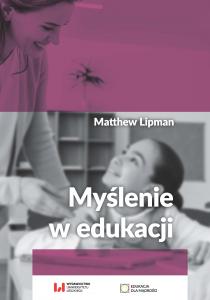-
2370
-
1602
-
1393
-
1238
-
1087
Myślenie w edukacji

Tłumaczenie publikacji M. Lipmana (1923–2010) – klasyka teorii edukacji, twórcy programu Philosophy for Children, który zapoczątkował nowy ruch edukacyjny ukierunkowany na rozwijanie myślenia. Książka stanowi syntezę wiedzy na ten temat. Autor skupia się na trzech formach myślenia: twórczym, krytycznym I troskliwym oraz sposobach Ich rozwijania.
Publikacja dla pedagogów, nauczycieli, edukatorów, studentów pedagogiki i innych kierunków humanistyczno-społecznych, badaczy edukacji, filozofów – dla wszystkich zainteresowanych sposobami postępowania umożliwiającymi uczniom na wszystkich poziomach kształcenia stanie się ludźmi bardziej refleksyjnymi, rozumniejszymi i rozsądniejszymi.
Lipman nie tylko przedstawia podstawy rzemiosła myślenia i sądzenia, ale pokazuje również, jak podstawowe narzędzie ukierunkowywania edukacji na myślenie – wspólnotę dociekania – można wykorzystać do zmniejszenia przemocy w klasie szkolnej i udoskonalenia kształcenia dzieci z grup ryzyka.
Dla praktyki pedagogicznej cenne są zwłaszcza przykłady naturalnych sytuacji szkolnych (instruktażowe dialogi, cytowane pytania). Mogą one dostarczyć nauczycielom ogólnych wskazówek, w jaki sposób konstruował własną praktykę edukacyjną ukierunkowaną na myślenie.
Parafrazując tytuł książki i łącząc go z serią wydawniczą: edukacja ukierunkowana na myślenie to mądra edukacja – taka, która w przemyślany sposób prowadzi uczniów i nauczycieli ku mądrości.
Dr hab. Iwona Czaja-Chudyba, prof. UP
Anderson Richard C. i in., The Snowball Phenomenon: Spread of Ways of Talking and Ways of Thinking across Groups of Children, „Cognitive and Instruction” 2001, t. 19, nr 1, s. 1–46.
Arnauld Antoine, Nicole Pierre, Logika czyli sztuka myślenia, przeł. i wstępem poprzedziła Seweryna Romahnowa, Państwowe Wydawnictwo Naukowe, Warszawa 1958.
Arystoteles, Etyka nikomachejska, przeł. Daniela Gromska, Państwowe Wydawnictwo Naukowe, Warszawa 1982.
Austin John L., Jak działać słowami, w: tegoż, Mówienie i poznawanie. Rozprawy i wykłady filozoficzne (s. 545–708), przeł., wstępem i przypisami opatrzył Bohdan Chwedeńczuk, Państwowe Wydawnictwo Naukowe, Warszawa 1993.
Austin John L., Philosophical Papers, wyd. 3., Oxford University Press, New York 1979.
Barry Kevin, King Leonard, Naloney Carmel, Philosophy for Children and the Promotion of Student High Level Cognitive Talk in Small-Group Cooperative Learning, „Critical and Creative Thinking: The Australian Journal of Philosophy for Children” 2001, t. 9, nr 1, s. 31–45.
Beardsley Monroe, Practical Logic, Prentice Hall, Englewood Cliffs, NJ 1950.
Black Max, Critical Thinking, wyd. 2., Prentice Hall, Englewood Cliffs, NJ 1952.
Bloom Benjamin S., Engelhart Max D., Furst Edward J., Hill Walker H., Krathwohl David R. (red.), Taxonomy of Educational Objectives, t. 1: Cognitive Domain, McKay, New York 1956.
Bocheński Józef M., O dialogu filozoficznym, przeł. autor, w: tegoż, Sens życia i inne eseje (s. 125–135), Wydawnictwo Philed, Kraków 1993.
Brentano Franz, Psychologia z empirycznego punktu widzenia, przeł., wstępem i przypisami opatrzył Włodzimierz Galewicz, Wydawnictwo Naukowe PWN, Warszawa 1999.
Buber Martin, Between Man and Man, Kegan Paul, London 1947.
Buber Martin, Ja i Ty. Wybór pism filozoficznych, przeł. Tadeusz Doktór, Instytut Wydawniczy Pax, Warszawa 1992.
Buchler Justus, Toward a General Theory of Human Judgement, Columbia University Press, New York 1951.
Buchler Justus, What Is a Discussion?, „Journal of General Education” 1954, t. 7, nr 1, s. 7–17.
Cognitive Behavior Checklist, IAPC, Upper Montclair, NJ 1990.
Cohen Morris R., Nagel Ernest, An Introduction to Logic and Scientific Method, Harcourt Brace, New York 1934.
Crawshay-Williams R., Methods and Criteria of Reasoning, Routledge and Kegan Paul, London 1957.
Damasio Antonio, The Feeling of What Happens, Harcourt, New York 1999; wyd. pol.: Tajemnica świadomości: ciało i emocje współtworzą świadomość, przeł. Maciej Karpiński, Dom Wydawniczy Rebis, Poznań 2000.
Davidson Donald, Essays on Actions and Events, Oxford University Press, New York 1980.
Davydov V.V., Problems of Developmental Teaching, przeł. Liv Tudge, M.E. Sharpe, Armonk, NJ 1986.
Davydov V.V., The Mental Development of Younger Schoolchildren in the Process of Learning Activity, „Soviet Education” 1988, t. 30, nr 10, s. 3–16.
Dewey John, Democracy and Education, Macmillan, New York 1916; wyd. pol.: Demokracja i wychowanie: wprowadzenie do filozofii wychowania, przeł. Zofia Doroszowa, wstęp Bogdan Suchodolski, Ossolineum, Wrocław 1972.
Dewey John, Experience and Education, Macmillan, New York 1938.
Dewey John, Experience and Nature, wyd. 2, Open Court, La Salle, IL 1929.
Dewey John, How We Think: A Restatement of Relation of Reflective Thinking to the Educative Process, D.C. Heath, New York 1933.
Dewey John, Logic: The Theory of Inquiry, Holt, New York 1938.
Dewey John, The Child and the Curriculum, University of Chicago Press, Chicago 1902.
Dewey John, Theory of Valuation, w: International Encyclopedia of Unified Science, t. 1, University of Chicago Press, Chicago 1939.
Dewey John, Bentley Arthur F., A Trial Group of Names, w: J. Dewey, A.F. Bentley, Knowing and the Known, Beacon Press, Boston 1949.
Dummett Michael, Meaning and Understanding, w: tegoż, The Interpretation of Frege’s Philosophy (s. 74–82), Harvard University Press, Cambridge, MA 1981.
Durkheim Émile, O podziale pracy społecznej, przeł. Krzysztof Wakar, Wydawnictwo Naukowe PWN, Warszawa 2011.
„Educational Leadership” 1984, t. 42, nr 1: Thinking Skills in the Curriculum.
Elgin Catherine Z., Considered Judgment, Princeton University Press, Princeton 1996.
Elias M.J., Clabby J.F., Teaching Social Decision Making, „Educational Leadership” 1988, s. 52–55.
Ennis Robert H., A Taxonomy of Critical Thinking Dispositions and Abilities, w: Joan Boykoff Baron, Robert J. Sternberg (red.), Teaching Thinking Skills: Theory and Practice, Freeman, New York 1987.
Ennis Robert, A Definition of Critical Thinking, „Harvard Educational Review” 1962, t. 32, nr 1, s. 81–111.
Ennis Robert, Logic for Teachers, Prentice-Hall, Englewood Cliffs, NJ 1969.
Fisher Alec (red.), Critical Thinking: Proceedings of the First British Conference on Informal Logic and Critical Thinking, University of East Anglia, Norwich 1988.
Frankfort Harry, The Importance of what We Care About, Cambridge University Press, New York 1998.
General Education in a Free Society, raport Harvard Committee, Oxford University Press, London 1946.
Glaser Edward, Experiment in the Development of Critical Thinking, Columbia University Press, New York 1941.
Glaser Robert, przedmowa do: Judith W. Segal, Susan F. Chipman, Robert Glaser (red.), Thinking and Learning Skills, t. 1, Erlbaum, Hillsdale, NJ 1985.
Goodman Nelson, Languages of Art, Bobbs-Merrill, Indianapolis 1968.
Govier Trudy, A Practical Study of Argument, wyd. 2, Wadsworth, Belmont, CA 1998.
Grice Paul, Logic and Conversation, w: tegoż, Studies in the Way of Words, Harvard University Press, Cambridge, MA 1989.
Hamlyn D.W., The Theory of Knowledge, Doubleday and Macmillan, London 1970.
Hampshire Stuart, In Defence of Radicalism, „Dissent” 1956, s. 170–176.
Harré Rom, The Formal Analysis of Concepts, w: H.J. Klausmeier, C.W. Harris (red.), Analysis of Concept Learning, Academic Press, New York 1966.
Hart W.A., Against Skills, „Oxford Review of Eduaction” 1978, t. 4, nr 2, s. 205–216; przedruk w „Thinking: The Journal of Philosophy for Children”, b.d., t. 5, nr 1, s. 35–44.
Hemingway Ernest, Zielone wzgórza Afryki, przeł. Bronisław Zieliński, Iskry, Warszawa 1984.
Hirst Paul H., Liberal Education and the Nature of Knowledge, w: R.F. Dearden, P.H. Hirst, R.S. Peters (red.), Education and the Development of Reason, Roultledge and Kegan Paul, London 1972.
Hirst Paul H., The Logical and Psychological Aspects of Teaching a Subject, w: R.S. Peters (red.), The Concept of Education (s. 44–60), Humanities Press, New York 1967.
How to Teach Decision-Making to Kids, w: U.S. News and World Report, 21 kwietnia 1986 r.
Hume David, Dodatek IV: O pewnych sporach słownych, w: tegoż, Badania dotyczące zasad moralności, przeł. Anna Hochfeld, Państwowe Wydawnictwo Naukowe, Warszawa 1975.
Hume David, O kryterium dobrego smaku, w: tegoż, Eseje z dziedziny moralności, polityki i literatury, przeł. Łukasz Pawłowski, Wydawnictwa Uniwersytetu Warszawskiego, Warszawa 2013.
Johnson Mark, Moral Imagination, University of Chicago Press, Chicago 1993.
Johnson Ralph H., Blair J. Anthony, From the Editors, „Informal Logic Newsletter” 1978, t. 1, nr 1.
Johnson Ralph H., Blair J. Anthony, Logical Self-Defense, Mc Graw-Hill, New York 1994.
Kant Immanuel, Logika, przeł. Artur Banaszkiewicz, słowo/obraz terytoria, Gdańsk 2005.
Kant Immanuel, Uzasadnienie metafizyki moralności, przeł. Mścisław Wartenberg, Państwowe Wydawnictwo Naukowe, Warszawa 1984.
Katz Jerrold J., Fodor Jerry A., The Structure of a Semantic Theory, w: J.J. Katz, J.A. Fodor (red.), The Structure of Language, Prentice Hall, Englewood Cliffs, NJ 1964.
Kuhn Thomas S., Dwa bieguny. Tradycja i nowatorstwo w badaniach naukowych, przeł. i posłowiem opatrzył Stefan Amsterdamski, Państwowy Instytut Wydawniczy, Warszawa 1985.
Lewis Michael, Michalson Linda, Children’s Emotions and Moods, Plenum Press, New York 1983.
Lipman Matthew, Caring as Thinking, „Inquiry: Critical Thinking across the Disciplines” 1995, t. 15, nr 1, s. 1–13.
Lipman Matthew, Critical Thinking – What Can It Be?, „Educational Leadership” 1988, t. 16, nr 1, s. 38–43.
Lipman Matthew, Kio and Gus, IAPC, Upper Montclair, NJ 1982.
Lipman Matthew, On Children’s Philosophical Style, „Metaphilosophy” 1984, t. 15, s. 318–330.
Lipman Matthew, The Seeds of Reason, w: Ronald T. Hyman (red.), Thinking Processes in the Classroom: Prospects and Programs (s. 1–15), New Jersey Association for Supervision and Curriculum Development, Trenton 1985.
Lipman Matthew, Thinking Skills Fostered by Philosophy for Children, w: Judith W. Segal, Susan F. Chipman, Robert Glaser (red.), Thinking and Learning Skills, t. 1: Relating Instruction to Research, Lawrence Erlbaum Associates, Hillsdale, NJ 1985.
Lipman Matthew, Sharp Ann Margaret, Wondering at the World, IAPC, Upper Montclair, NJ 1986.
McPeck John E., Critical Thinking and Education, St. Martin’s, New York 1981.
McPeck John E., Paul’s Critique of ‘Critical Thinking and Education’, „Informal Logic” 1985, t. 7, nr 1, s. 45–54.
Mead George H., The Psychology of Social Consciousness Implied in Instruction, „Science” 1910, t. 31, s. 688–693; przedruk pt. Language as Thinking w „Thinking: The Journal of Philosophy for Children”, b.d., t. 1, nr 2, s. 23–26.
Mead George H., Umysł, osobowość, społeczeństwo, przeł. Zofia Wolińska, Państwowe Wydawnictwo Naukowe, Warszawa 1975.
Michaelis John U., Social Studies for Children, Prentice Hall, Englewood Cliffs, NJ 1985.
Michaelis John U., Hannah Larry B., A Comprehensive Framework of Objectives, Addison-Wesley, Reading, MA 1977.
Moll Luis C. (red.), Vygotsky and Education, Cambridge University Press, New York 1990.
Muir Edwin, Collected Poems, Oxford University Press, New York 1965.
New Jersey Test of Reasoning Skills, IAPC, Upper Montclair, NJ 1983.
Nickerson Raymond S., Why Teach Teaching, w: J.B. Baron, R.J. Sternberg (red.), Teaching Thinking Skills: Theory and Practice, W.H. Freeman and Co., New York 1986.
Nussbaum Martha, Emotions as Judgements of Value, „Yale Journal of Criticism” 1992, t. 5, nr 2, s. 201–211.
Oakeshott Michael, Poezja i jej głos w rozmowie ludzkości, przeł. Łukasz Sommer, w: tegoż, Wieża Babel i inne eseje (s. 243–296), przeł. Adam Lipszyc, Łukasz Sommer, Michał Szczubiałka, Fundacja Aletheia, Warszawa 1999.
Paul Richard W., McPec’s Mistakes, „Informal Logic” 1985, t. 7, nr 1, s. 35–43.
Peirce Charles S., Ideals of Conduct, w: Charles Hartshorne, Paul Weiss (red.), Collected Papers of Charles Sanders Peirce, t. 1, Harvard University Press, Cambridge, MA 1931–1935.
Peirce Charles S., Jak uczynić nasze myśli jasnymi?, w: Hanna Buczyńska-Garewicz, Peirce (s. 128–151), Wiedza Powszechna, Warszawa 1966.
Peirce Charles S., Utrwalanie przekonań, w: Hanna Buczyńska-Garewicz, Peirce (s. 107–127), Wiedza Powszechna, Warszawa 1966.
Perkins David N., Salomon Gavriel, Teaching for Transfer, „Educational Leadership” 1988, t. 46, nr 1, s. 22–32.
Peters R.S., The Concept of Education, Humanities Press, New York 1967.
Platon, Polityka, w: tegoż, Dialogi, t. 2, przeł. Władysław Witwicki, Wydawnictwo Antyk, Kęty 1999.
Raths Louis E., Wassermann Selma, Jones Arthur, Rothstein Arnold, Teaching for Thinking (1967), wyd. 2, Teachers College Press, New York 1986.
Ratner Joseph (red.), Intelligence in the Modern World: John Dewey’s Philosophy, Random House, New York 1939.
Report on the Windsor Symposium, „Informal Logic Newsletter” 1978, t. 1, nr 1.
Rhees Rush, Discussions on Wittgenstein, Routledge and Kegan Paul, London 1970.
Rogoff Barbara, Observing Sociocultural Activity on Three Planes: Participatory Appropriation, Guided Appropriation and Apprenticeship, w: J.V. Wertsch i in. (red.), Sociocultural Studies of Mind (s. 139–164), Cambridge University Press, New York 1995.
Rothbart M., Evens M., Fulero S., Recall for Confirming Events: Memory Processes and the Maintenance of Social Stereotypes, „Journal of Experimental
Social Psychology” 1979, t. 15, s. 343–355.
Royce Josiah, The Problem of Christianity, University of Chicago Press, Chicago 1968.
Ryle Gilbert, A Rational Animal, w: tegoż, Dilemmas, Cambridge University Press, New York 1966.
Ryle Gilbert, Formal and Informal Logic, w: tegoż, Dilemmas (s. 111–129), Cambridge University Press, New York 1966.
Ryle Gilbert, Hume, w: G. Ryle, Collected Papers, t. 1, Barnes and Noble, New York 1971.
Ryle Gilbert, Perceiving, w: tegoż, Dilemmas (s. 93–102), Cambridge University Press, New York 1966.
Ryle Gilbert, Thinking and Self-Teaching, w: Konstantin Kolenda (red.), Symposium on Gilbert Ryle, „Rice University Studies” 1972, t. 58, nr 1; przedruk w „Thinking. The Journal of Philosophy for Children”, b.d., t. 1, nr 3–4, s. 18–23.
Saw Ruth L., Conversation and Communication, „Thinking: The Journal of Philosophy for Children”, b.d., t. 2, nr 1, s. 55–64.
Scheffler Israel, The Language of Education, C.C. Thomas, Springfield, IL 1978.
Schilder Paul, Image and Appearance of the Human Body, Routledge and Kegan Paul, London 1935.
Schön Donald, The Reflective Practitioner, Basic Books, New York 1993.
Scriven Michael, The Logic of Criteria, „Journal of Philosophy” 1959, t. 56, s. 857–868.
Selman Mark, Another Way of Talking about Critical Thinking, w: Barbara Arnstine, Donald Arnstine (red.), Proceeding of the Forty-third Annual Meeting of the Philosophy of Education Society (s. 169–178), Philosophy of Education Society, Normal, IL 1988.
Shakespeare William, Sonety, przeł. Stanisław Barańczak, Wydawnictwo a5, Wydawnictwo CiS, Poznań–Warszawa 1996.
Shapiro Meyer, Vincent van Gogh, Abradale Press, New York 1994.
Slote Michael A., The Theory of Important Criteria, „Journal of Philosophy” 1966, t. 63, nr 8, s. 221–224.
Smith B. Othanel, Ennis Robert, Language and Concept of Education, Rand McMally, Chicago 1961.
Spivack George, Shure Myrna, The Social Adjustment of Young Children, Jossey-Bass, San Francisco 1974.
Stebbing Susan, Thinking to Some Purpose, Penguin, Harmondsworth 1939.
Sternberg Robert, Critical Thinking: Its Nature, Measurement, and Improvement, w: Frances R. Link (red.), Essays on the Intellect, ASCD, Alexandria, VA 1985.
Stewart Helen, The Ontology of Mind: Events, Processes and States, The Clarendon Press, Oxford 1977.
Sutman Frank X., We need a Better Understanding of Inquiry in Instruction, „Harvard Education Letter” 2000, t. 16, nr 5.
Tharp Roland G., Gallimore Ronald, Rousing Minds to Life, Cambridge University Press, New York 1988.
„Thinking: The Journal of Philosophy for Children” b.d., t. 3, nr 2.
Urmson J.O., On Grading, „Mind” 1950, t. 59, nr 234, s. 145–169.
Veblen Thorstein, The Higher Learning in America, Sagamore, New York 1957.
Vendler Zeno, Res Cogitans, Cornell University Press, Ithaca, NY 1972.
Vermazen Bruce, Comparing Evaluations of Works of Art., w: W.E. Kennick (red.), Art and Philosophy (s. 707–718), wyd. 2, St Martin’s, New York 1979.
Weil Simone, Selected Essays, 1934–1943, przeł. z j. franc. sir Richard Rees, Oxford University Press, London 1962; przedruk za pozwoleniem A.D. Peters & Co. Ltd.
Wilen W. (red.), Teaching and Learning through Discussion, Charles C. Thomas, Sprinfingfield, IL 1990.
Wittgenstein Ludwig, Dociekania filozoficzne, przeł. Bogusław Wolniewicz, Wydawnictwo Naukowe PWN, Warszawa 2008.
Wittgenstein Ludwig, O pewności, przeł. Wojciech Sady, Fundacja Aletheia, Warszawa 1993.
Wolfflin Heinrich, Podstawowe pojęcia historii sztuki. Problem rozwoju stylu w sztuce nowożytnej, przeł. Danuta Hanulanka, słowo/obraz terytoria, Gdańsk 2017.
Yoos George E., A Work of Art as a Standard of Itself, „Journal of Aesthetics and Art Criticism” 1967, t. 26, nr 1, s. 81–90.
Licencja
LicencjaJak cytować
Dyscypliny
- Archeologia
- Bibliologia i informatologia
- Biologia
- Chemia
- Ekonomia i zarządzanie
- Etnologia i antropologia kulturowa
- Filologia polska
- Filologie obce
- Filozofia
- Fizyka
- Geografia
- Historia
- Językoznawstwo
- Judaica
- Kultura i sztuka
- Literaturoznawstwo
- Matematyka
- Pedagogika
- Podręczniki dla cudzoziemców
- Politologia i stosunki międzynarodowe
- Prawo
- Psychologia
- Socjologia
- Varia
- Otwarty dostęp
Seria
- 100 lat niepodległości
- Akademia Samorządowa
- Akademia Zarządzania i Finansów
- Aktywni (nie)pełnosprawni
- Analecta Literackie i Językowe
- Bałkany XX/XXI
- Bibliotheca Litteraria
- Bibliotheca Philosophica
- Biografia i Badanie Biografii
- Byzantina Lodziensia
- Contemporary Asian Studies Series
- Cyfryzacja
- Edukacja dla Mądrości
- Ekonomia
- Filmo!znawcy
- Finanse
- Gerontologia
- Interdyscyplinarne Studia Miejskie
- Interpretacje Literackie
- Jerzy Giedroyc i…
- Jerzy Giedroyc i Świadkowie Historii
- Jesień Życia?
- Językoznawstwo
- Judaica Łódzkie
- Jurysprudencja
- Kim Jest Człowiek?
- Kognitywistyka
- Komunikacja i Media
- Krótkie Wprowadzenie
- Kultura Literacka Łodzi
- Literaturoznawstwo. Sylwetki
- Łódzkie Studia z Językoznawstwa Angielskiego i Ogólnego
- Łódź w PRL. PRL w Łodzi
- Manufactura Hispánica Lodziense
- Marketing
- Monografie Sekcji Socjologii Niepełnosprawności PTS
- Nauka Sztuki – Sztuka Nauki
- Oblicza feminizmu
- Oblicza wojny
- Perspektywy Biograficzne
- Politologia
- Polska a Europa Środkowo-Wschodnia w XX wieku
- Polska Kultura Filmowa
- Prawo
- PRL. Biografie
- Projekt: Egzystencja i Literatura
- Psychologia Wszystkiego
- Research on Science & Natural Philosophy
- Romanistyka dla Teatru
- Series Ceranea
- Stała Konferencja Pedagogiki Społecznej pod Patronatem Komitetu Nauk Pedagogicznych PAN
- Sztuka-Media-Kultura
- Terapia Pedagogiczna
- Twórczość i Edukacja
- Vade Nobiscum
- Warsztaty z Geografii Turyzmu
- W poszukiwaniu idei XXI wieku
- W Wieży Babel po polsku
- Zarządzanie
- Życie prywatne Polaków w XIX wieku










